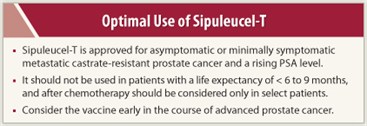When sipuleucel-T (Provenge) was approved by FDA in April 2010, it was the first vaccine to be approved as a treatment for prostate cancer and was hailed as a major advance. Although sipuleucel-T is now reimbursable by Medicare, some physicians are not clear about when to use it, and patients who are not ideal candidates for the vaccine may demand it. Current evidence suggests that the vaccine’s optimal use is early in the course of metastatic castrate-resistant prostate cancer and before chemotherapy is considered.
 “Patient selection for sipuleucel-T should be based on data, not on instinct or financial consideration. Selection involves clinical judgment,” said Simon J. Hall, MD, Chair of Urology at the Mount Sinai School of Medicine, New York. He spoke at the 2011 Chemotherapy Foundation Symposium in New York.
“Patient selection for sipuleucel-T should be based on data, not on instinct or financial consideration. Selection involves clinical judgment,” said Simon J. Hall, MD, Chair of Urology at the Mount Sinai School of Medicine, New York. He spoke at the 2011 Chemotherapy Foundation Symposium in New York.
Sipuleucel-T is a vaccine derived from the patient’s own white blood cells following exposure to prostatic acid phosphatase (PAP), and it is designed to stimulate production of T-cell immunity against cells expressing PAP. The vaccine is approved for the treatment of asymptomatic or minimally symptomatic metastatic castrate-resistant prostate cancer. Treatment is administered three times every other week for a total of 5 weeks, and a course of treatment is estimated to cost about $93,000.
Demonstrating Effectiveness
Dr. Hall reminded listeners that the vaccine is for treating established disease and the goal is disease control, not disease eradication. “We have little experience in humans with immunotherapy and how to determine whether it is effective,” he said.
Clinical trials and experience with the vaccine has shown that it takes time to demonstrate an effect on clinical endpoints. Even when induction of immunity can be seen on the ELISPOT assay of T cells, there is a lack of correlation with clinical endpoints, Dr. Hall explained.
 The pivotal studies for FDA approval showed that the vaccine improves overall survival by a median of about 4 months. “It takes 6 to 9 months [from the time of treatment] to show a difference in survival,” he said. “Therefore, if a patient has a life expectancy less than 6 to 9 months, the vaccine will not be of benefit,” he commented.
The pivotal studies for FDA approval showed that the vaccine improves overall survival by a median of about 4 months. “It takes 6 to 9 months [from the time of treatment] to show a difference in survival,” he said. “Therefore, if a patient has a life expectancy less than 6 to 9 months, the vaccine will not be of benefit,” he commented.
Issues with the vaccine that need to be resolved include timing, sequencing, and where the vaccine falls in the treatment paradigm. Several treatments for castrate-resistant prostate cancer have been shown to extend survival, including docetaxel, cabazitaxel (Jevtana), abiraterone (Zytiga), sipuleucel-T, and radium-223 (not yet approved), and whether to combine these treatments—as well as the best sequencing for them—remains to be established.
Timing of Therapy
Thus far, evidence suggests that the earlier a patient with castrate-resistant prostate cancer is treated with the vaccine, the better the outcome. No data are available about using the vaccine in patients before they have bone disease. Dr. Hall said use of sipuleucel-T in this setting may be a good option, but more studies are needed.
“The vaccine should be used only with caution in patients postchemotherapy, because these patients are usually quite sick,” he noted.
“Sipuleucel-T has minimal impact on reducing PSA levels and limited impact as seen on bone scans. The timing of treatment should be based on your judgment. It is not clear if abiraterone plus prednisone or chemotherapy plus prednisone blunt the immunity induced by the vaccine, so rethink using chemotherapy if you are considering sipuleucel-T,” Dr. Hall said. ■
Disclosure: Dr. Hall reported no potential conflicts of interest.
Expert Point of View: Sipuleucel-T Should Be Used Early in Metastatic Castrate-resistant Prostate Cancer, before Chemotherapy
Reference
1. Hall SJ: Optimizing patient selection for sipuleucel-T in prostate cancer. Chemotherapy Foundation Symposium XXIX: Innovative Cancer Therapy for Tomorrow. Presented November 11, 2011.

 “The main message [from Dr. Hall’s presentation at the 2011 Chemotherapy Foundation Symposium] is that we need to think about using sipuleucel-T early in men with prostate cancer who are asymptomatic but are castration-resistant and metastatic. “If there is going to be a benefit [of the vaccine],...
“The main message [from Dr. Hall’s presentation at the 2011 Chemotherapy Foundation Symposium] is that we need to think about using sipuleucel-T early in men with prostate cancer who are asymptomatic but are castration-resistant and metastatic. “If there is going to be a benefit [of the vaccine],...